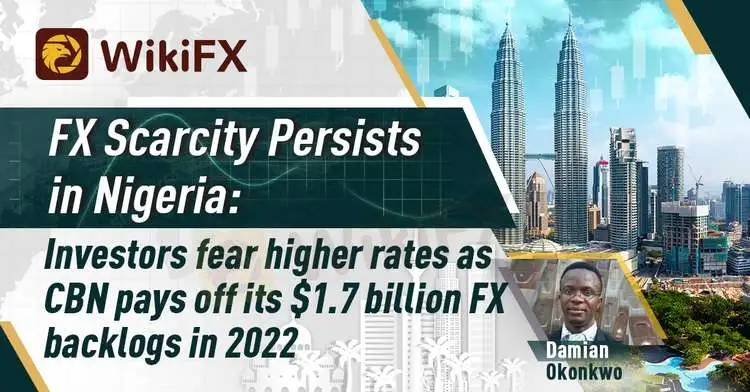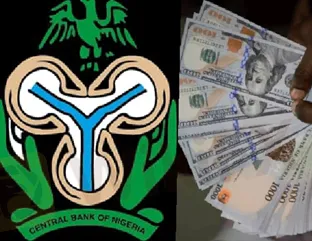简体中文
繁體中文
English
Pусский
日本語
ภาษาไทย
Tiếng Việt
Bahasa Indonesia
Español
हिन्दी
Filippiiniläinen
Français
Deutsch
Português
Türkçe
한국어
العربية
FX Scarcity Persists in Nigeria: Investors fear higher rates as CBN pays off its FX backlogs
Abstract:The poor liquidity in the supply of FX in the Nigerian exchange market had persisted up to the last week of June 2022. Contrary to the public expectations that more individuals and politicians will be selling off their dollars after the just concluded primaries to provide more liquidity in the market, yet none seem to be willing to sell off their foreign currencies at the market. This had further created more scarcity on the Nigerian FX market. The exchange rate at the black market up to this last week of June is given at #608 per dollar.

By: Damian Okonkwo
Investors are currently more perplexed than ever; as they fear the rate might increase further in September when the Central Bank of Nigeria (CBN) will be embarking on paying off its FX backlogs to foreigners and FX forward contracts totalling $1.7 billion.

The poor liquidity in the supply of FX in the Nigerian exchange market had persisted up to the last week of June 2022. Contrary to the public expectations that more individuals and politicians will be selling off their dollars after the just concluded primaries to provide more liquidity in the market, yet none seem to be willing to sell off their foreign currencies at the market. This had further created more scarcity on the Nigerian FX market. The exchange rate at the black market up to this last week of June is given at #608 per dollar.
Investors are currently more perplexed than ever; as they fear the rate might increase further in September when the Central Bank of Nigeria (CBN) will be embarking on paying off its FX backlogs to foreigners and FX forward contracts totalling $1.7 billion.
Following the decision of the CBN to offset its backlogs in 2022, World Bank has projected a massive decline in the Nigerian foreign exchange reserve. This means the country will likely borrow more in 2023 to offset its budget.
According to the world bank reports, the country's foreign reserve rose to $41.3bn at the end of 2021, which offered it an opportunity for exchange rate adjustment.
However, the body revealed that “Nigeria issued additional Eurobonds for $1.25bn in March 2022.” With this, the gross FX reserves are projected to decline in 2022, as the CBN is expected to clear the FX backlog to foreigners (estimated at $1.7bn as of end-October) and FX forward contracts.
The report further observed that direct investments into the Nigerian economy have been low in 2022 due to the country's constant fluctuating exchange rate which has greatly discouraged more investors from coming into the country.
Following this report, economists believe that the Nigerian economy is currently moving backward rather than progressing. Investors are currently losing hopes in the economy especially as the political sphere is filled with uncertainty over who becomes the next leader of the country and his ability to rescue the country from an imminent recession.
The Central Bank of Nigeria has been supplying dollars to the FX market, but this is really affecting it's foreign reserves, which fell to $38.546 billion on June 10, from $39.124 billion on May 10.
The high scarcity of dollars witnessed at the exchange market today seems to have kick-started in July 2021, after the CBN banned the sale of forex to Bureau de Change (BDC) dealers accusing them of being a channel for illegal FX flows. They further placed the task on the Nigerian deposit Money banks (DMB) to foresee the sales of FX to their clients who now depend on them rather than the BDC. Since then, there has been high scarcity created for FX due to reduced suppliers. The bank either has not fulfilled this mandate satisfactorily to their clients too. This has forced the exchange rate to rise from #545 on the black market in 2021 to #606 in June 2022 marking over a 24% increase so far.
Given the high demand and apparent lack of liquidity in the supply of FX by the relevant authorities, the Nigerian banks have now mandated a one-month notice from travelers who needed FX for their travels and basic allowances.
This ugly situation has pushed traders and travelers to seek a prompt response from the black market dealers rather than embark on a long waiting for the banks to deliver.
Nigeria is currently experiencing an FX crisis due to the high demand and low supply in the market.
The Nigerian exchange window has given no hope of a promising tomorrow to mellow the crisis. While oil prices have risen so high last month up to $120 per barrel during the first week of June, before the little decline to $108, Nigeria has made nothing significant out of it, due to oil theft and the terrorist bombing of its oil wells. Also, the country's dependence on foreign countries to refine their oil products and sell them back to them has turned them into beggars of their resources. There have been lower exportations this year unlike in the previous years.
Above all, the aggressive interest rate hikes by foreign countries especially the US, Canada, and prospectively Europe by next month, had all the more increased the FX exchange rate in Nigeria which is likely to persist until significant progress is made on the country's economic development.

Disclaimer:
The views in this article only represent the author's personal views, and do not constitute investment advice on this platform. This platform does not guarantee the accuracy, completeness and timeliness of the information in the article, and will not be liable for any loss caused by the use of or reliance on the information in the article.
Read more

Top 10 Trading Indicators Every Forex Trader Should Know
Master the top 10 Forex trading indicators to analyze real-time Forex quotes, trends, and market signals. Learn strategies to boost accuracy and avoid mistakes.

Geopolitical Events: What They Are & Their Impact?
You've heard many times that geopolitical events have a significant impact on the Forex market. But do you know what geopolitical events are and how they affect the FX market? Let us learn about it today.

Why Do You Feel Scared During Trade Execution?
Trade execution is a pivotal moment for traders. It is when analysis turns into action, and potential profits or losses become reality. However, for many traders, this moment is accompanied by fear. Why does this happen, and how can you address it?

WikiEXPO Global Expert Interview: Simone Martin—— Exploring Financial Regulation Change
In the midst of financial innovation and regulation, WikiGlobal, the organizer of WikiEXPO, stays abreast of industry trends and conducts a series of insightful and distinctive interviews on pivotal topics. We are delighted to have the privilege of inviting Simone Martin for an in-depth conversation this time.
WikiFX Broker
Latest News
Geopolitical Events: What They Are & Their Impact?
Top 10 Trading Indicators Every Forex Trader Should Know
Why Do You Feel Scared During Trade Execution?
Currency Calculator


